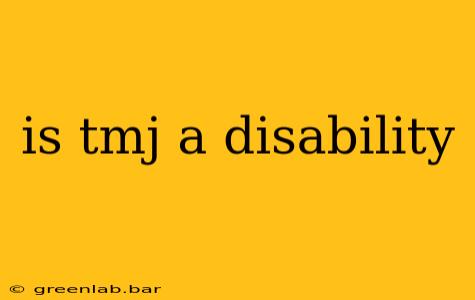Temporomandibular joint (TMJ) disorder is a prevalent condition affecting the jaw joint and surrounding muscles, causing pain, clicking, and limited movement. Many sufferers grapple with the question: Is TMJ a disability? The answer isn't a simple yes or no. The determination hinges on several crucial factors and varies significantly depending on individual circumstances and the legal definition of disability used.
Understanding TMJ and its Impact
TMJ disorder can significantly impact daily life. Symptoms can range from mild discomfort to debilitating pain, affecting eating, speaking, and even sleeping. Severe cases can lead to:
- Chronic Pain: Constant, unrelenting pain can interfere with work, social activities, and overall well-being.
- Limited Mobility: Difficulty opening and closing the mouth can hinder basic functions like eating and speaking.
- Headaches and Migraines: TMJ is often linked to headaches and migraines, exacerbating discomfort and disability.
- Psychological Impact: Chronic pain and functional limitations can contribute to anxiety, depression, and reduced quality of life.
These effects can undeniably impact a person's ability to perform daily activities and participate fully in society. However, the extent of this impact varies greatly between individuals.
TMJ and Disability Claims: Legal Considerations
Whether TMJ qualifies as a disability under the law depends on the specific legal framework being considered. Different countries and jurisdictions have different criteria for determining disability. Generally, these criteria focus on whether the condition significantly limits one or more major life activities.
Here's a breakdown of considerations:
Severity of Symptoms:
The severity of your TMJ symptoms plays a critical role. Mild, intermittent discomfort is unlikely to qualify as a disability. However, debilitating, chronic pain that significantly limits daily activities may be considered disabling.
Functional Limitations:
A key factor is whether your TMJ significantly limits your ability to perform major life activities, such as:
- Working: Can you maintain employment due to your TMJ symptoms?
- Self-Care: Are you able to perform basic self-care tasks, such as eating, dressing, and bathing?
- Social Interaction: Does your TMJ impact your ability to engage in social activities?
Medical Documentation:
Comprehensive medical documentation is essential for any disability claim. This includes:
- Diagnosis: A clear diagnosis of TMJ disorder from a qualified healthcare professional.
- Treatment History: Details of your treatment attempts, including successes and limitations.
- Functional Assessments: Evaluations that document the limitations imposed by your TMJ on your daily activities.
Seeking Support and Guidance
Navigating the complexities of disability claims related to TMJ can be challenging. Seeking professional help is crucial:
- Consult with a Doctor: Ensure your medical records accurately reflect the severity of your TMJ and its impact on your life.
- Seek Legal Counsel: A disability lawyer can help you understand the legal requirements and guide you through the process.
- Join Support Groups: Connecting with others who understand your experiences can provide emotional support and practical advice.
Conclusion: A Case-by-Case Determination
Ultimately, whether TMJ is considered a disability is a case-by-case determination based on the individual's specific circumstances and the applicable legal standards. While TMJ can undeniably cause significant impairment in severe cases, it's crucial to understand the specific criteria for disability claims in your jurisdiction and gather comprehensive medical documentation to support your application. Seeking professional medical and legal guidance is strongly recommended.

